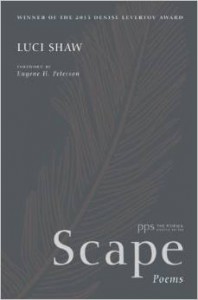As I get older, I’m noticing something about myself.
Things I didn’t have much time for when I was younger seem to be more important.
Things like art exhibitions. Poetry. Watching bees and hummingbirds in the garden (I spent several minutes sitting at our kitchen window on Saturday, watching a hummingbird flit from flower to flower in the garden).
Maybe I simply have more time. Children are grown and on their own. Work has become less about career and more about accomplishment. Retirement is looming.
I’m paying more attention. And I’m paying more attention to the creative acts, and acts of creation, around me.
I’m not alone in this. I hear friends saying similar things.

The title itself, Scape, is intriguing. She provides three definitions: in botany, “a plant stem growing directly from the ground”; in biology, “a stalk-like part such as the shaft of a feather”; and in architecture, “a stake, column, or support.” The word comes from the Latin for shaft or stalk, and it’s not unrelated to a number of familiar words like landscape. Shaw uses those three definitions to organize the 65 poems in the collection.
Many of the poems are about nature, as one might expect, but Shaw uses the theme in unexpected ways. She traces the veins of a leaf like the veins of a human hand, veins particularly pronounced with age (I speak from experience). Or a ramble upon a rocky seashore becomes a meditation about succeeding generations. Nature, and the creation that is nature, lead back to the pinnacle of creation—man and woman—and to the creator.
She’s also playful. Look at this poem about a rainstorm.
Thunder and then the rain comes and the
prairie that has been baked dry and the
shriveled grass and the ground that has
thirsted all summer open like mouths as
the wet arrives at first in whispers and
then in sheets of silver arrows that tear the
air and join like the clapping of hands to
a downfall that makes splashes in the dirt
and grows to pools that shine in the silver light
and the dry creeks with their stones begin to
thank God for sending water for their need
so that there is praise in the rushing streams
and the trees also raise praise with their leaves
flashing and now wind like a fist takes hold of the
house and shakes it and us and it seems that
all the world is drowning in the delight of deluge.
I like what Shaw does here. Notice how many lines end in “and the” or “the.” Three times she breaks prepositional phrases between lines. This structure provides a kind of breathless reading, as does the fact the entire poem is one sentence, and this successfully conveys in the structure of words and lines the sounds and the experience of a rainstorm. The poet not only uses words to convey an idea or a meaning but also the sounds of words to amplify the subject.
Shaw’s poems in Scape remind me of that hummingbird in the garden, its sleek green body and staccato-like wing movements proving a unity of form and purpose as it drinks its fill of the flowers. These are poems about the beauty of creation, and the creative act, written with a perceptive and understanding eye.
Image by Gareth Lovering, Creative Commons via Flickr. Post by Glynn Young, author of the novels Dancing Priest and A Light Shining, and Poetry at Work.
Want to brighten your morning coffee?
Subscribe to Every Day Poems and find some beauty in your inbox.
- Longfellow’s “Paul Revere’s Ride”: Creating a National Legend - April 17, 2025
- Poets and Poems: Katie Kalisz and “Flu Season” - April 15, 2025
- Poets and Poems: Michelle Ortega and “When You Ask Me, Why Paris?” - April 10, 2025


Mary Sayler says
Excellent review, Glynn. Your comments will be helpful to other poets too, so I’ll highlight your post on the Christian Poets & Writers blog – http://christianpoetsandwriters.blogspot.com.
Glynn says
Mary – thank you so much. (And a tireless champion of poetry you are!)
SimplyDarlene says
Just the title alone is intriguing.
As always, thanks for this review, sir Glynn.
Blessings.
Glynn says
I read Shaw’s explanations of what a “scape” was, and I looked the word up in the dictionary. Another concept of “shaft” from Roman times would be the shaft of a spear — which I think is a pretty cool idea for what a poem can be. Thanks for reading and the comment!
Katie says
I realize this post and the comments are from three years ago – but after reading about Luci Shaw and then experiencing her “Thunder and Then” poem I still want to share a memory this recalled for me.
I grew up in South Eastern NC. During August usually we would have what folks referred to as “dog days” (when it would rain nearly everyday for two or three weeks straight). Oh, the torture for a child who loved to be outside! I was SO glad that we had a screened in porch that we could go out on to watch and smell a thunderstorm. We had louvered aluminum windows upstairs and my Mom would send me rushing up there to crank them in so the downpour wouldn’t puddle up on the window sills or worse, get the rugs or beds wet. I also recall the thrill of feeling the house shake when a peal of thunder was just overhead and the glass in the windows clattered.
As I’ve remembered these times I’ve nearly smelled the rain getting close and then felt the spray of it wetting my hand and forearm as I furiously rolled in those windows.:)
Maureen Doallas says
Lovely review. Wonderful imagery in Shaw’s poem here.
Glynn says
I really enjoy her poetry. Thanks for the comment, Maureen.
Sandra Heska King says
I love Luci.
Glynn says
Sandra, why does your comment make me think of an old TV show?
Thanks for reading!
Prasanta says
She takes us right into that rainfall.
I enjoyed reading the review; thank you.
Jody Lee Collins says
Glynn, I bought this book in Seattle at the AWP Conference and have been relishing it ever since. My favorite so far–‘The Clinic’–I could so relate.
Thank you for sharing this wonderful book with Tweetspeak Readers.
Megan Willome says
I like this poem especially because she writes about rain the way I think about rain–“the delight of deluge.”
We’re in the market, if anyone up there wants to send some.